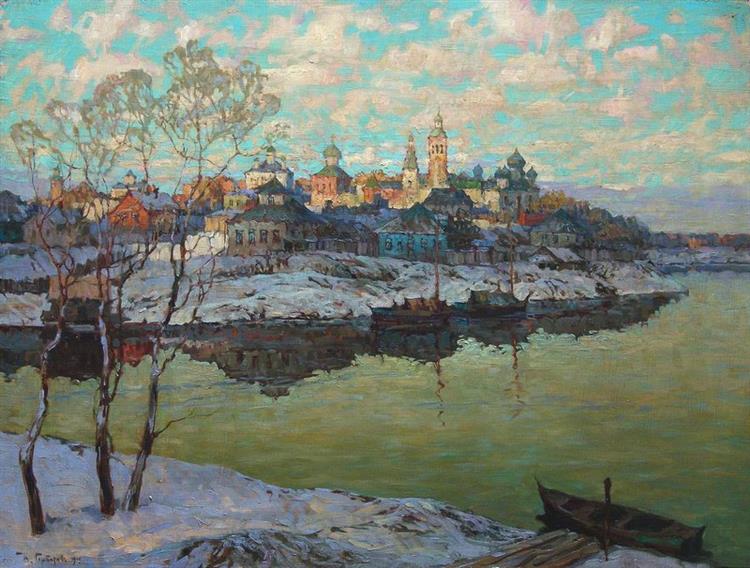Description
Konstantin Gorbatov, a prominent representative of Russian postimpressionism, endowed his works with a unique sensitivity that reflected both his cultural heritage and his personal vision. The painting "Principles of Spring - 1916" is an exquisite example of its mastery and its ability to capture the seasonal transition with great subtlety and beauty.
In this work, Gorbatov represents a moment of the arrival of spring in a pastoral environment. The composition is harmonious and balanced, focused on a traditional house and a snowy road that guides the viewer's gaze towards the heart of the painting. Through this provision, Gorbatov manages to transmit the stillness and gradual defrosting that characterizes the first days of spring.
The use of color is one of the most outstanding features of this painting. Gorbatov uses a limited but effective palette, dominated by cold blue and faint ocher, in contrast to the soft snow whites. These shades not only capture the fresh and still winter atmosphere of the beginning of spring, but also create a contemplative and serene atmosphere. The loose and textured brushstroke adds dynamism and reflects the constant interaction between light and natural elements.
Another notable aspect in "Principles of Spring" is the detailed representation of traditional Russian architecture. The buildings, with their inclined roofs and chimneys, are a testimony of Gorbatov's interest in narrating the daily environment of his time. The texture of wood and deretted snow on the structures are captured with thoroughness, highlighting the artist's technical expertise. Soft shadows and delineated contours contribute to the three -dimensionality and realism of the scene.
Although painting lacks human figures, its absence does not decrease the sense of life and movement in the work. The landscape itself seems to be in transition, as if the thaw and the return of bright colors anticipate the arrival of human activity. This implicit natural resurgence connects with the issue of rebirth and regeneration, common in spring representations.
Of the author, Konstantin Gorbatov, it is known that he had an eclectic training, influenced both for his education in the Imperial Academy of the Arts of St. Petersburg and for his permanence in Italy and Germany. These experiences enriched his style, allowing him to amalgamate the Russian artistic tradition with contemporary European innovations. Gorbatov is known for its landscapes and gender scenes that radiate a deep sense of nostalgia and romanticism, visible characteristics in "principles of spring."
In conclusion, the painting "Principles of Spring - 1916" is a work that invites a contemplative observation, highlighting the narrative power of the landscape and the artist's technical skills. Through a careful composition and a surprising use of color, Gorbatov celebrates the changing face of nature and reaffirms its position as one of the great performers of the Russian landscape. His work remains a tribute to the beauty of natural cycles and the eternal ability of painting to capture ephemeral moments with majesty.
KUADROS ©, a famous paint on your wall.
Hand-made oil painting reproductions, with the quality of professional artists and the distinctive seal of KUADROS ©.
Art reproduction service with satisfaction guarantee. If you are not completely satisfied with the replica of your painting, we refund your money 100%.

